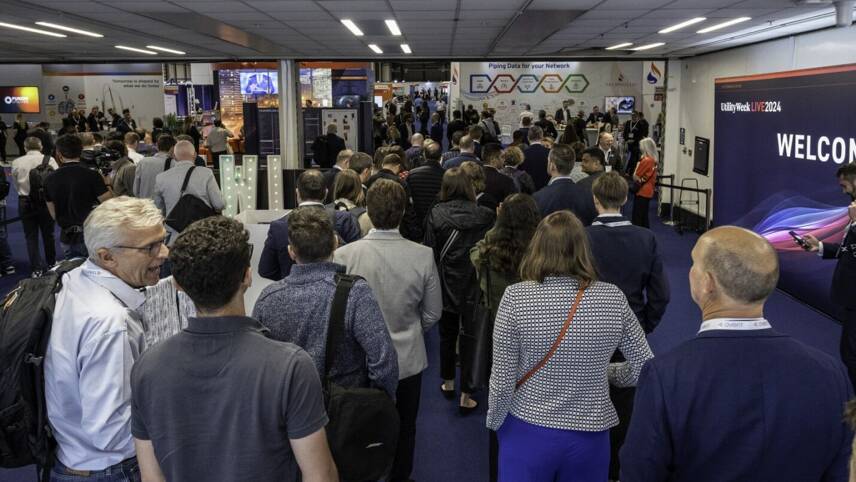This is the Sponsored paywall logged out

Flexibility’s presence at Utility Week Live was impossible to ignore. From keynote presentations to the inaugural Flex Awards, the theme of flexibility ran through two bumper days of content. Thermal Storage UK founder Tom Lowe picks out his highlights.
This year’s Utility Week Live had a strong theme around flexibility. How do we shift when people and businesses consume and use electricity so that it is lowest cost and lowest carbon. Attendees came from energy suppliers, network operators, manufacturers and aggregators to explore how to maximise electricity flexibility. Utility Week Live helped to bring together people working on the different bits of innovation that make flexibility work.
Greg Jackson, Octopus Energy’s CEO, kicked off the event by highlighting how British people and businesses had engaged with the Demand Flexibility Service through energy suppliers such as Octopus and British Gas during the winter of 2023 / 24. He drew parallels between British supermarkets offering marked down food at the end of the day and the energy system offering lower electricity prices when renewable generation is plentiful. He saw zonal pricing as a way of passing on lower electricity prices in different regions, much the same as house prices vary regionally. Listening to Mr Jackson speak about electricity is completely different to how any other chief executive in the sector talks about energy. Even if you did not follow every strand of the flurry of slides and topics, the sense conveyed was that the electricity system was rapidly changing and flexibility was at the heart of the new design.
It was not just the keynote speeches that drew the big audiences. The Energy Flexibility Stage was so packed throughout the two days that it was standing room only. There was a strong focus on electrification being decarbonisation. To give some highlights.
One of the first sessions was a dedicated discussion about industrial and commercial flexibility, a welcome nod to the huge scope of electricity demand shifting among businesses. Arjan Geveke from the Energy Intensive Users Group set out the scale of electricity (and gas) flexibility available and the importance of giving clear and early price signals to manufacturers of ceramics and glass. Jake Miller from Drax highlighted the difference between automated dispatch through products such as EVs and more manual dispatch that requires process interruption. He went on to recommend that the Demand Flexibility Service is retained for businesses where manual dispatch is required.
The Distribution System Operators (DSOs) were out in force to highlight the importance of flexibility to both defer and avoid network infrastructure upgrades. Maurice Lynch from Northern Powergrid highlighted that electricity demand will double on the distribution network by 2050. He stressed that engineering solutions alone cannot be the answer and highlighted their ongoing work with communities. Dr Geraldine Paterson from Electricity North West provided insights into the trading platform they have developed to allow assets to curtail or to trade for someone else to curtail.
I chaired a session on unlocking domestic flexibility and decarbonised heat, a sector responsible for a further 20% of the UK’s carbon emissions. Flexibility is even more important because installing a heat pump will roughly double electric demand at a property and charging an EV involves another doubling in consumption. Andrew Schein from Octopus Energy’s Centre for Net Zero highlighted how the Demand Flexibility Service showed the willingness of people to turn down their electricity demand. Alex Howard from UK Power Networks explained that electrified heat will shape the size of the network in the medium-term but the short-term challenge is integrating distributed generation and EVs. Elizabeth Allkins from the energy retailer Ovo set out the commercial offerings coming to market for low carbon technologies such as heat pumps and heat batteries. Alex Jakeman from Guidehouse provided insights into how the 1,000 participants in the Equinox trial are enjoying heat pump flexibility.
I noticed that, by coincidence, the new Building Safety Regulator (BSR) was holding a conference in the NEC at the same time. To maximise flexibility, we need the BSR to work with the UK government departments responsible for energy and housing to ensure that the Home Energy Model and Future Homes Standard support, rather than hinder, the deployment of flexible assets.
The Flex Awards
In the evening, Utility Week hosted the inaugural version of their Flex Awards. I was pleased to act as a lead judge for two of the categories and to present the award for best domestic proposition. A diverse group of companies such as Kraken, UK Power Networks, Dimplex and Piclo took home awards. The awards ceremony was packed and it seems almost certain that Utility Week will hold these awards again in some form next year.
You would expect more entrants for the awards next year. As both a judge and someone working on industrial heat decarbonisation, I’d welcome seeing a strong set of entries for the industrial and commercial category that recognises the innovation and investment going into business flexibility. I’d also welcome seeing domestic flexibility propositions that are less reliant on the Demand Flexibility Service.
Tom Lowe is the Founding Director of Thermal Storage UK, the trade association that promotes heat flexibility and heat batteries for domestic heating and industrial decarbonisation.
Please login or Register to leave a comment.